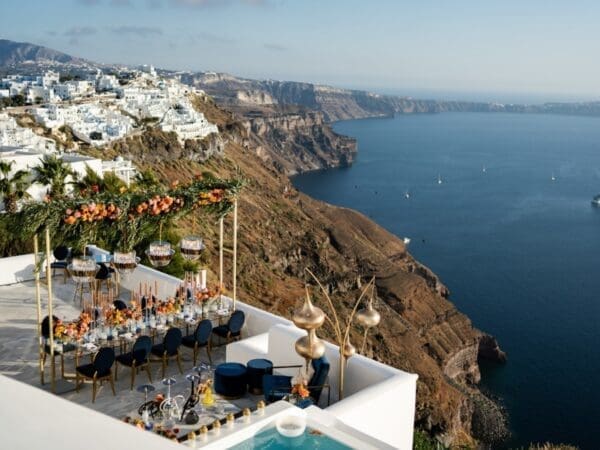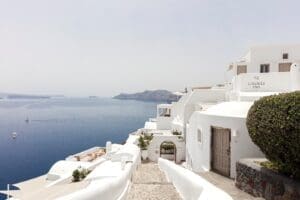
Santorini possesses one of the most irrefutably incredible landscapes in the world. From its soaring cliffs overlooking the calm azure Aegean Sea to the white, red, and black sand beaches formed by eons of volcanic activity, Thera, the island’s official name in Greek, has become synonymous with the nation’s interpretation of hospitality. It remains a longstanding and foremost destination for luxury romantic escapes and families looking for authentic experiences.
The ironic part is that the same tectonic forces that have shaped this wondrous natural beauty for many millions of years – and therein act as a key draw for tourists – also causes the occasional disruption. So it was that in early February this year, a series of minor earthquakes in the Cyclades (the island chain containing Santorini) prompted the authorities to close the island to tourists, only to lift the ban as of the beginning of March ahead of a full opening in April and what’s likely to be a busy peak season for 2025.
Despite this temporary scare with all its resultant travel rearrangements and cruise ship reroutes, such quakes and precautionary restrictions are ‘nothing new at all’ as we learned during our meeting with Markos Chaidemenos, the Managing Director for the boutique hotel brand and owner-operated Canaves Collection.
With five properties offering luxury suites and villas on the island including Canaves Oia Suites, Canaves Ena, Canaves Sunday, Canaves Elefas Villas and Canaves Epitome, what this family-run collection reveals is how to craft special occasions in a magical setting by taking advantage of the surrounding area. It’s a timeless tale in hospitality, yet it so often requires a fierce passion and love of the land that only a local possesses.
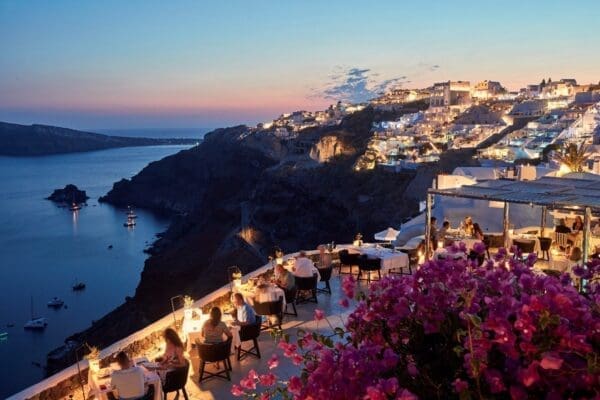
Rugged Beauty and Beautiful Hospitality
As a second-generation hotelier who has grown up on Santorini, Chaidemenos has seen these sorts of earthquake-born disruptions play out before. During our time together, he offered a humbling, reassuring perspective that’s yet one more enduring lesson for every hotelier confronting a crisis management situation.
“When it comes to geology, you need magma to create the magnificent. Of course, we always take precautions for our guests. But just look at the history. Santorini is the only actively inhabited caldera in the world, with this latest form of rugged, beautiful scenery carved by volcanic eruptions during the Ottoman era in the 1600s. And then there were earthquakes in the 1940s, in the 1950s and so on. Yet, the people here are tough, reflecting their rocky surroundings and we’re always ready to welcome people back.”
That welcoming attitude is now centerstage yet again, with the island contributing approximately 2.5% to Greece’s GDP, or roughly 5.9 billion euros (source: BBC). Santorini has a natural resilience in its spirit that makes it one of the most sought-after destinations on the globe.
To color this scene some more, besides the volcano-born landscapes that offer incredible hiking experiences, another big draw for the island is its history. You have the archaeological site of Akrotiri that marks the remains of the Minoan civilization from around 1600 BCE – and some may even claim this as evidence of Atlantis! – through to the island’s time as a Venetian trading post when the famed town of Oia was only a cliffside fortress on watch for pirates. Then came the post-Independence era in the mid-1800s and early 1900s when the modern Cycladic architecture style of whitewashed buildings and blue-domed churches was defined.
Agronomically, Santorini is famous for its cherry tomatoes that draw on the volcanic soil for intense flavor in addition to its white eggplant and fava beans. The island also has a deep heritage of winemaking, wherein vines have been cultivated in a way to protect them from the strong winds. Never watered, the grapes get all the hydration they need from the humidity of the air, therein producing one-of-a-kind vintages for guests to try.
In this sense, Santorini is becoming a health destination much like Ikaria – a Blue Zone where its residents are acclaimed for their longevity – with people traveling specifically to the island to relish in its all-organic, all-local ingredients (as protected by municipal laws governing agricultural practices that restrict the use of chemicals). The food in Santorini is now its own draw with private chef experiences quite popular amongst villa guests.
This exceptional combination is what’s so often codified as ‘sense of place’ in hospitality. As Chaidemenos listed off how the geography, farming and culture intersect, what he emphasized was that Santorini has ‘layers to discover’ as supported by some of the best hospitality in Greece to help guests unearth all the activities at their disposal.
First timers may want to take in those iconic views from Oia and visit the red or black beaches along the southern coast of the island. Returning guests in contrast may be more enticed to partake in an immersive cultural activities or learning about the unique agronomy. Therein, these layers and the flexibility to accommodate a variety of travel reasons ultimately become ways for guests and groups to bond through shared experiences, which is what drives memorable stays and repeat visits.
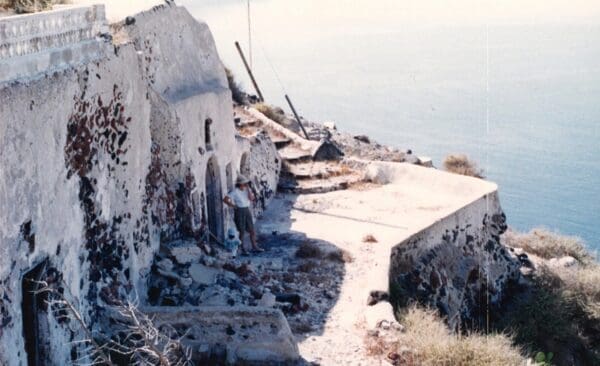
The History of Canaves Is a History of the Community
As hotels are about storytelling, this lesson is best revealed through the origins of this hotel collection, going back as far as the 1970s when Ioannis Chaidemenos – Markos’s father – was mayor of the town of Oia in a time when it had its own government. Ioannis had the foresight to usher in laws that both restrained building designs and signage to conform with the localized interpretation of the Cycladic style, and also limited the total number of hotel, restaurant, bar and café licenses given out. For one to open, another must close.
At the time, residents protested, but protecting and preserving was part of the family philosophy. Looking back a half century later, though, we can see that this prescience helped to thwart the overtourism and over-commercialization of Santorini, thus preserving its charm and cultural iconography. Ioannis also embarked on the construction of a desalination plant to make Oia totally independent for water and sewage recycling while also putting cable lines underground to prevent disruptions from earthquakes. It was all part of a generational vision.
The story of the founding of Canaves Collection began in 1994 with the opening of Canaves Traditional Houses in a prime position right on the edge of Oia with panoramic view of the cliffside town as well as the caldera. Embracing Santorini’s history, a ‘canaves’ is the Greek word for the wine caves that were built into the cliffs so as to preserve the flatter lands for farming and to take advantage of the cold winds for natural air conditioning.
The first property to adapt the Cycladic design style and architecture to Santorini, this hotel was developed from family-owned structures that went way back to Markos’s great grandfather who was one of the biggest winemakers in Oia. To maintain the original layout during the conversion to a hotel, everything had to be handmade in order to implement the Cycladic style onto Santorini’s rounded caves. With no corners in any of the rooms, all the furniture was custom-made, which became a collaborative effort with local manufacturers.
This meticulousness was repeated after Chaidemenos assumed the leadership position in 2010 with a new round of restorations and an upleveling into luxury accommodations, transforming the original property into Canaves Oia Boutique Hotel which is now Canaves Ena (which itself underwent a refurbishment and name change just last year). With the huge cost of construction for renovating the cavern structure all by hand, on paper no parsimonious accountant would ever approve of it and yet it’s exactly what was required to launch an immersive experience brand.
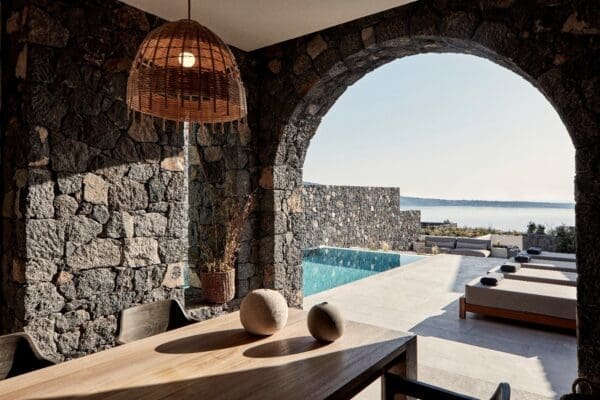
To help sell the dream, Chaidemenos had to start traveling aboard to spread the word – primarily to the United States – becoming an ambassador and steward for the island in the process. While the interior design style in the post-pandemic travel era has evolved away from the Cycladic all-white-and-blue into the more earthy tones with natural timber and dark marble accents to reflect the island’s volcanic origins, the emphasis is still resolutely focused on empowering locals to cocreate the story of Santorini through artisanal furniture, linen, pottery and artwork production.
As an example of this local stewardship and collaboration, for the latest addition to Canaves Oia Suites of five suites which just recently in April 2025, the Chaidemenos family selected Kapsimalis Architects, a firm based out of Santorini. Each suite having its own private infinite pool, one of the goals in the design brief was to embody this new volcanism style with softer, neutral fabrics, sustainably sourced materials, a minimalist aesthetic and a more seamless blend of indoor-outdoor living spaces.
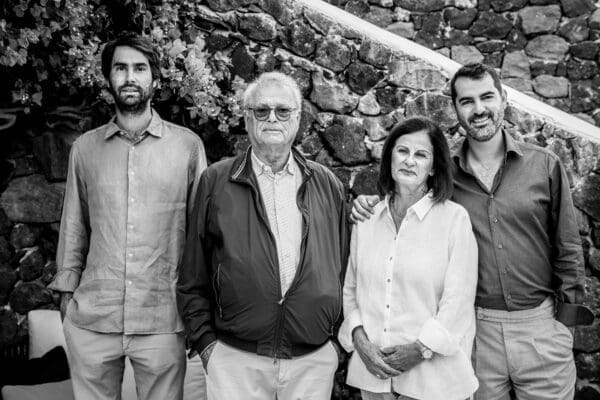
Santorini as a Multigenerational Travel Mecca
Another winning bet for Canaves Collection occurred in the mid-2010s when the senior team started shifting the area planning of its hotel to favor villas and multi-bedroom configurations rather than smaller, single-king and double-queen guestrooms. This meant scaling back the key count by half on what a site could fit in order to accommodate what Chaidemenos saw as the next big thing: multigenerational travel.
As he remarked, “Many travelers now want the best of both worlds. They want privacy for their families or group of friends in the villa, but they still want access to a resort pool or signature restaurant to fraternize with a community of likeminded guests. When we first set out to craft these sorts of on-premises experiences, many were still locked into a mindset of total occupancy and rates. They were, in a way, missing the forest for the trees, as once you build the exceptional experience, the RevPAR will take care of itself.”
This blend of privacy and a sense of community is a universal truth for luxury travel nowadays, whereby hotels act as homebases for small groups to experience a destination together, bonding in the process. For this, the example offered was the collection’s newest property, Canaves Epitome, which has a five-bedroom villa with 6,000 square feet of indoor and 6,000 square feet of outdoor space. Barbecue equipment comes standard in all suites for in-room dining and private chef experiences.
For all to take note, it’s these flexible room configurations that also help to support both longer lengths of stay as well as increased shoulder and offseason travel by ensuring that there are spaces for small groups to bond together besides relying on the pool and nearby beaches.
The activities that help to round out these guest journeys need not be anything too elaborate aside from being the best of what the local area has to offer. For Santorini this means artisanal wine tours, olive oil tastings, cooking demonstrations, pottery classes or possibly a guided mountain bike excursion through Tholos Naftilos, the park on the unoccupied island in the center of the archipelago.
Moreover, Chaidemenos believes that the family-owned nature of Canaves Collection also plays a big role in this uptick in LOS and shoulder season occupancy, specifically because there’s a culture of real hospitality which attracts those who are truly passionate for the industry, reflecting this positive aura back onto the guests.
Taken together, the geology, the history, the design, the food and the people all act in unison to highlight the true meaning of a sense of place. We can’t help but end by recalling one of the island’s other names from antiquity: Kallistae, meaning the ‘most beautiful one’. Despite this latest shudder from the depths below, travel to Santorini is what’s truly immortal because it has so many layers of experiences to offer; it only needs a guiding hand to bring those to the forefront for guests from around the world.
